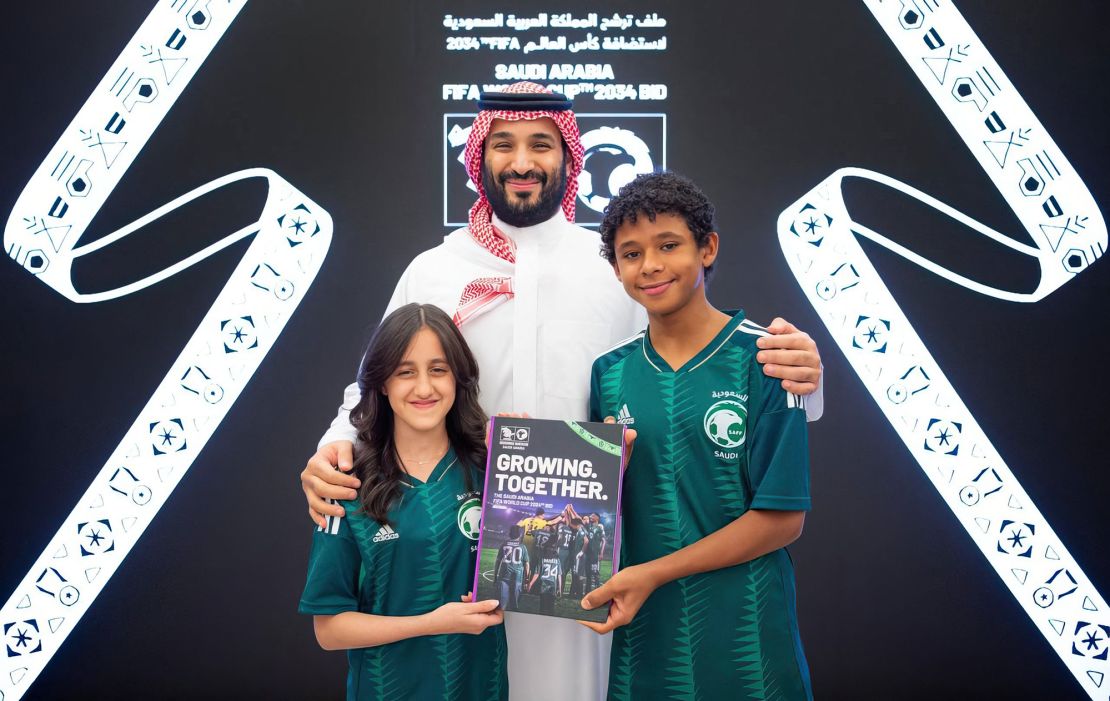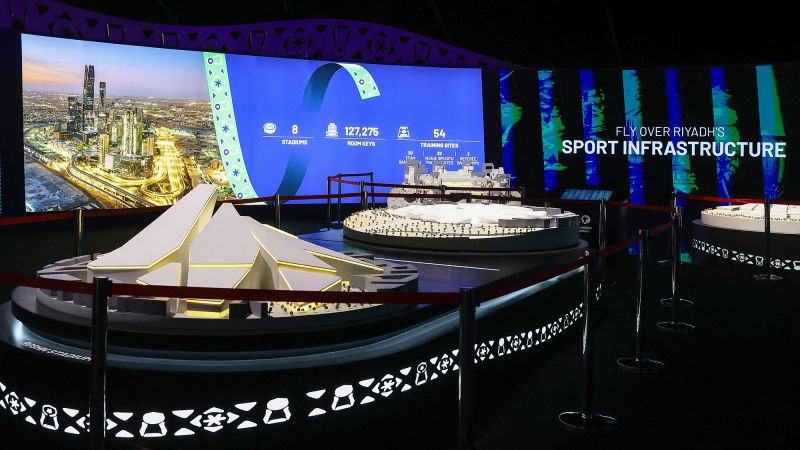Amnesty International has urged FIFA to halt the process of awarding Saudi Arabia the 2034 World Cup until major human rights reforms are announced.
On Monday, Amnesty International and the Sport & Rights Alliance (SRA) released a brief highlighting purported issues around Saudi Arabia’s 2034 bid. The brief also called for a “credible human rights strategy” for the 2030 World Cup, which is set to be co-hosted by Spain, Portugal and Morocco.
Soccer’s world governing body FIFA is set to name the host nations for both the 2030 and 2034 World Cups next month. There is only one bid for both tournaments.
As part of the bidding process, FIFA states that countries must respect “internationally recognized human rights,” but Amnesty International’s latest report concluded that “neither bid has adequately demonstrated how they have met FIFA’s human rights criteria.”
It added: “While a more credible human rights strategy is required for the 2030 tournament, the outstanding risks in Saudi Arabia are so severe that FIFA should halt the bidding process for the 2034 tournament until major reforms are introduced.”
In a statement to CNN, FIFA said it will publish the “bid evaluation reports” for both the 2030 and 2034 World Cups ahead of a congress on December 11.
“FIFA is implementing thorough bidding processes for the 2030 and 2034 editions of the FIFA World Cup, in line with previous processes for the selection of hosts for the FIFA Women’s World Cup 2023 in Australia and New Zealand, the FIFA World Cup 2026 in the United States, Mexico and Canada and the FIFA Women’s World Cup 2027 in Brazil,” a FIFA spokesperson told CNN.
Following its investment in several sporting competitions, Saudi Arabia has outlined ambitious plans for the 2034 World Cup.
The country has committed to significant infrastructure projects from transport connections to new cities, in addition to building or renovating 11 stadiums and 185,000 new hotel rooms, among other major projects and developments, per Amnesty International’s latest report.
According to the official website of the 2034 bid, Saudi Arabia said it “championed a human rights approach, leveraging the expertise from across the Kingdom and beyond.”
It also said it would use the tournament to “bring opportunity and responsibility to uphold human rights throughout this journey and beyond.”
However, Steve Cockburn, Amnesty International’s Head of Labour Rights and Sport, says the plans will “require a vast number of migrant workers to deliver” and that “there are no commitments to reform the country’s exploitative ‘Kafala’ sponsorship system, establish a minimum wage for non-citizens, permit them to join trade unions or introduce new measures to prevent worker deaths.”
“Kafala” refers to a sponsorship system which ties migrant workers to a specific employer. According to Human Rights Watch, employees are “vulnerable to widespread abuse, including contract substitution, exorbitant recruitment fees, non-payment of wages, confiscation of passports by employers, and forced labor.
Despite a series of reforms announced by Saudi Arabia in recent years, employers “still hold disproportionate control over workers,” according to Human Rights Watch.
“There will be a real and predictable human cost to awarding the 2034 World Cup to Saudi Arabia without obtaining credible guarantees of reform,” Cockburn added.
“Fans will face discrimination, residents will be forcibly evicted, migrant workers will face exploitation, and many will die. FIFA must halt the process until proper human rights protections are in place to avoid worsening an already dire situation.”
Amnesty International says the new projects will also result in forced evictions, while claiming the bid’s strategy fails to address discrimination against women and the criminalization of same-sex relations.
Homosexuality is officially illegal in Saudi Arabia, though last year, the kingdom said that it welcomes LGBTQ tourists.
“Saudi Arabia’s human rights strategy does not address the government’s severe repression of free speech and the continued imprisonment of individuals who have been sentenced to decades in prison merely for their expression, suggesting that there is no serious commitment to reform,” Cockburn added.
CNN has reached out to the Saudi Arabia Football Federation (SAFF) for comment.

Saudi Arabia has previously resisted allegations of “sportswashing,” which involves countries using high-profile sporting events to project a favorable image of their nation worldwide, often to shift attention away from alleged wrongdoing.
Saudi Crown Prince Mohammed bin Salman has previously said he doesn’t “care” about the country’s investments being described as sportswashing.
Last year, Saudi Arabia’s sports minister Prince Abdulaziz bin Turki Al Faisal told BBC Sport that sportswashing claims against the country were “very shallow” and played down criticism over the rights of migrant workers in the build up to 2034.
The new report also addresses concerns regarding the 2030 World Cup.
While the tournament is set to be co-hosted by Spain, Portugal and Morocco, the first three games will be played in Uruguay, Paraguay and Argentina.
In June, Amnesty International and SRA released a report highlighting some of the human rights issues facing organizers, such as the “excessive use of police force against crowds” and the “improper use of rubber bullets” in all three host countries, as well as restrictions on freedom of expression.
It also highlighted the possibility of “forced evictions” in Morocco due to the scale of projects outlined by the bid – including a new 115,000-seater stadium outside of Casablanca.
CNN has attempted to contact the Moroccan government for comment regarding possible evictions.
“Morocco, Portugal and Spain must take their human rights responsibilities far more seriously,” Cockburn said.
“The 2030 World Cup could provide an opportunity to strengthen human rights protections in all three countries, but only if governments and football associations are prepared to work closely with fans, human rights organizations, trade unions and other impacted groups to do so.”
In a statement to CNN, the Portuguese Football Federation (FPF) said the bid process was “based on strict compliance with all the principles and public requirements already announced by FIFA” and was done “in close coordination with the respective governments and other competent authorities.”
The FPF added that the joint bid “has already prepared a study that frames and signals the main concerns and recommendations in terms of human rights for this project and which will be attached to the final dossier”.
CNN has reached out to the Spanish and Moroccan football associations for comment.






